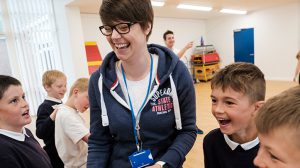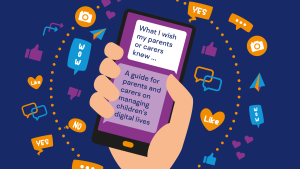I hope one of the positives to emerge from the national lockdown will be a greater appreciation for those people who work on the frontline of our public services – the care workers, the social workers and of course the NHS staff. All of them have kept this country going during an unprecedented time. The last few weeks have been a very timely reminder that there are millions of people in our country who are dedicated to caring for us and protecting us when we need help most.
We are also being reminded just what a brilliant job our teachers do for our children. Many parents who are juggling home-schooling and work will have a particular appreciation of how hard a teachers’ job is, and all they do for our children.
Teachers take a class of 30 children, often from a wide range of backgrounds, and they form a connection which develops and enriches the lives of their pupils. They share their knowledge, their experience, and help nurture new skills and a child’s emotional development. There is a very good reason why we remember our best teachers for the rest of our lives.
The resources available to parents during this lockdown to help them to keep their children engaged with learning are astonishing. So many organisations have stepped up and found new ways of keeping children entertained, active and busy. Yet, for most parents and children, other than those who had already made the decision to home school before this crisis ever appeared, it will never be the same as being taught by a teacher.
If I’m ill, I want a doctor or nurse. If I’m a child, who needs an education, in most case I want a teacher. Just like doctors, teachers are highly trained and specialised professionals. While so many parents are doing a great job of helping their children with schoolwork and doing their best to replicate school learning, for most parents it is extremely difficult to provide anything similar to what teachers offer our children. So many of our teachers are superstars, not just for capturing and keeping children’s attention and teaching them, but for the wider opportunities they offer to kids, and the emotional support too.
But they are superstars who are constricted in what they can do by the current circumstances facing them. Teachers are still working, and currently going to extraordinary lengths to try and support children with new resources. Some are often providing other forms of support to families, such as hand-delivered food parcels or checking in on children they know are vulnerable and who they worry about. For most teachers, school and teaching is about so much more than setting a curriculum. Teaching is about the classroom environment and live interaction with children.
There are some children for whom this connection is particularly important. The disadvantaged child who lacks support at home but whom school gets into university; the child with ADHD who the teacher helps establish a whole set of coping mechanisms; the children starting school with such a low-level of development that they cannot sit-still, communicate or use the toilet. For all these children, teachers perform a particular miracle.
Recently, I spoke to one teacher in a primary school serving a particularly disadvantaged area. Less than half of her pupils or parents had logged on to the Google Classroom to download the materials. This teacher knew that despite her best efforts, many of her pupils weren’t really getting any meaningful education, and we all know there are hundreds of thousands of children in England in the same position.
Often there are good reasons for this. Families are dealing with this unusual situation in different ways, and there will be children who find it hard to settle or concentrate at home or are just overwhelmed by the whole experience. Other parents are battling to do a full time job from home while trying to make sure their kids are doing the school work. It can be a struggle for mums and dads and the children themselves.
This teacher felt like a doctor seeing a sick patient, but not able to administer the medicine.
But the frustration the teacher I spoke to felt was not just in the lack of education some children were receiving, it was knowing what she could be doing for those children if they were back in her classroom. This teacher felt like a doctor seeing a sick patient, but not able to administer the medicine.
Later this week the Prime Minister is expected to set out some kind of timetable for schools to reopen. In my view, this cannot come soon enough, but should always of course be driven by the science and the medical experts.
It may be some time before all our children are in school all at the same time. There is no doubt though that when schools do start to open again, there will be new challenges on teachers, whose pupils have missed out on a full-time education for the equivalent of an extended summer holiday.
It will be a challenge for children too. Many will be itching to get back to school. They miss their friends, they miss the routine, they miss the buzz and fun of school. Many will also miss their teachers. It is going to be hard for all of them, and some more than others. Other children will have enjoyed their time away from school and liked spending more time with their family than is normally the case. They won’t want those days to end and will miss the informality and security being at home with your family can bring.
It is our teachers who will have to re-engage all of these children and get them back into the groove of learning. I know teachers will rise brilliantly to the challenge but we should also recognise that the job will be harder than ever, and for those teachers in areas that are already disadvantaged, it will be harder still. They will need the Government to give them the support and resources they need, not just to catch up but to help them tackle the generational, wide-ranging problems that were there before this crisis, and will be there – in some cases worsened – after it.






